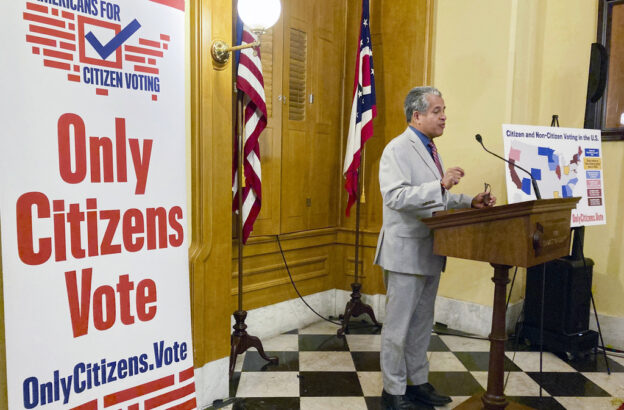Marta, a Honduran noncitizen immigrant who lives in a suburban Atlanta apartment complex, just wanted the two men who appeared at her door and said they were there to help Latinos navigate the election system “to go away.” Fearing she might be deported if she said the wrong thing, when they asked her if she had registered to vote, she just answered yes, hoping that would satisfy them.
It did indeed, though not the way she thought. The men, who surreptitiously videotaped the encounter, were working with the Heritage Foundation on a quest to reveal the extent of noncitizen voting, which is illegal (other than in a few local municipalities for local offices). The group eventually posted a video showing Marta and other noncitizens who also said they had registered to vote.
In truth, though, Marta (who, for obvious reasons, did not want her surname to be publicized) was not registered to vote and had never tried to register in the nine years that she had lived in the United States, according to a private fact-checking group brought in to investigate. Two other women who were featured in the video were also tracked down and confessed to having lied about registering to vote. State investigators found no evidence that any of the seven people on the tape had ever registered to vote.
Nevertheless, the video concluded that, “Based on our findings, the integrity of the 2024 election is in great jeopardy.” Elon Musk, X’s owner, helped the video go viral (it amassed more than 56 million views).
The issue of noncitizens preparing to vote in droves in November is on the political front burner. It has, in fact, held up approval of the federal budget. Because, appended to the budget proposal has been the “Safeguard American Voter Eligibility Act,” or SAVE, which would require voters to present proof of citizenship, like a passport or birth certificate, in order to be able to vote.
Last week, House Speaker Mike Johnson failed to pass a six-month extension of government funding with the measure, insisted upon by former President Trump and many Republican members of Congress, attached. Early this week, Congressional leaders reached an agreement (without a SAVE component) to keep the government working for three months, pushing final budget decisions until after the election.
Politics aside, though, the SAVE provision seems sane. Noncitizens should not be permitted to vote.
And they are not. There is already a federal law that penalizes any noncitizen who tries to vote. Illegally voting in a federal election can land a violator in prison for a year, and a noncitizen found guilty of voting faces deportation and denial of future immigration status. That, opponents of SAVE contend, is more than sufficient deterrent.
And SAVE’s requirement to prove citizenship, they add, would disenfranchise millions of voters. Less than half of Americans hold passports, and obtaining birth certificates, which few people have handy, can be time-consuming and requires payment of a fee.
But whether those critics are correct or not, is noncitizen voting a problem in the first place?
According to the libertarian Cato Institute’s Walter Olson, “Those who levy sensational charges [of widespread illegal voting] should bear the burden of proving them. But they haven’t.”
Even the Heritage Foundation itself has documented only 23 cases of noncitizens voting – over the course of two decades.
There have been glitches, though. Oregon’s DMV has revealed that, due to a “data entry issue,” it mistakenly registered at least 306 non-citizens as voters since 2021. The error was caught, though, before any of those registrants had a chance to try to vote.
More than any previous presidential election season, this one’s fuel seems to be fomenting fear. Each candidate doesn’t just tout his or her accomplishments or qualifications, and doesn’t just attack the opponent’s. Each claims that if he or she loses the election, the country will be destroyed, pushed off the brink into dictatorship or anarchy or fascism.
And unfounded fears of things like noncitizens voting en masse ratchet up the fear factor.
Despite all the panic-purveying, though, and whoever wins, let’s hope that, post-election, the republic will not only, b’ezras Hashem, survive but thrive.
© 2024 Ami Magazine
